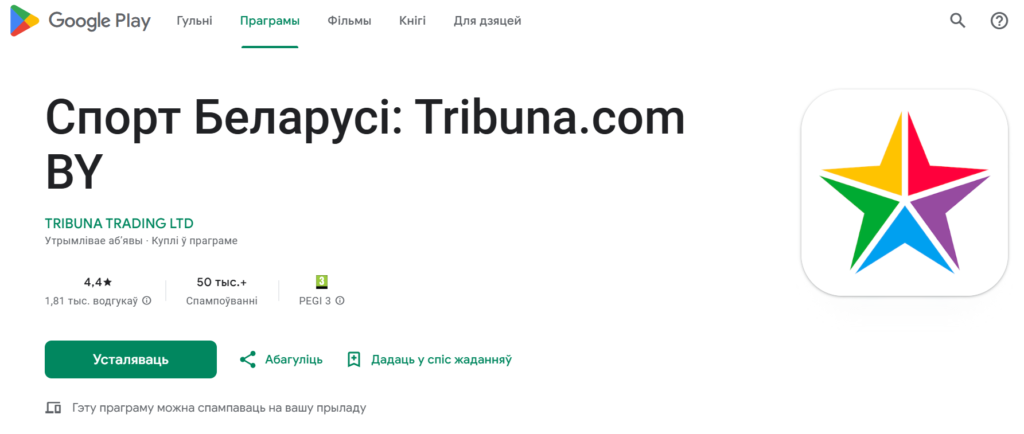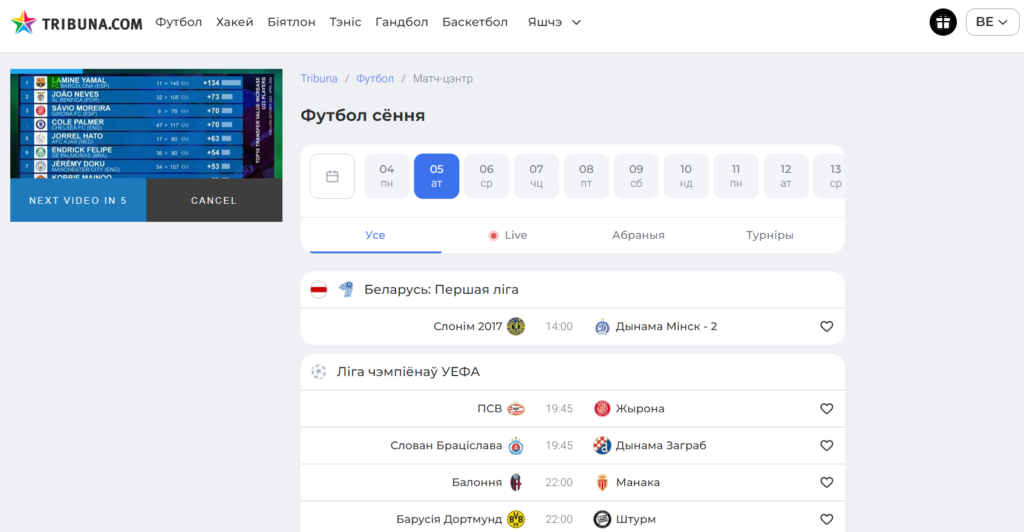“We’re on the verge of setting trends.” How Tribuna is building the most tech-driven sports media for Belarusians
The sports outlet “Tribuna” is actively expanding its network of apps and services – cutting-edge not just for Belarus, but for the entire region.Belarusian Association of Journalists spoke with Tribuna’s director, Maksim Berazinski, about how modern technologies are being integrated into their journalistic and editorial work.

Maksim Berazinski, head of Tribuna. Photo courtesy of his personal archive
“You can only analyze what you see on TV”
Our conversation with Maksim in an online format is quite a familiar thing for journalism in recent years. But even the possibility of remote communication is absolutely insufficient to overcome the obstacles created by the Belarusian authorities for independent journalists.
— We are extremely limited in our options for gathering information. This requires effort to come up with what was once very simple.
For example, when Dinamo Minsk plays at the Minsk Arena. Previously, you could go to the hockey game and get a report from there, find the director, ask questions, and gather comments. Now, you can only analyze what you see on TV. It’s a completely different approach.
The same goes for insider information. You need to stay in touch with people who know it, somehow verify the information. But now, the risks of passing somewhat exclusive information to people in Belarus have greatly increased, and that makes contact harder. We are looking for ways to solve this, but the repression continues, the situation only worsens, so it’s still difficult.
“We integrate into people’s lives through different parts of our service”
However, the technical development of the publication is not driven by repression, but by the mere emergence of new technologies and opportunities, notes Maksim Berazinski. At the same time, working in this direction helps Tribuna minimize some of the consequences of the current restrictions in Belarus.
— Throughout our existence, we’ve always strived to stay ahead of the technical aspects that can help us reach the audience interested in sports. Before 2020, we had apps and a wide presence on all the social media platforms used by Belarusians. We also tried to work on YouTube, because some people might watch a video, but won’t go searching for information on a website. On all the markets we operate in, we have large social media followings, says Maksim.
At its peak in Belarus (understandably, after 2020 there were many unsubscribes), we had about 180,000–190,000 followers; in Ukrainian networks, over 3.5 million; and internationally – more than 15 million (on Facebook and Instagram).
Now, one of the key platforms for the publication is the app.
— Because we understand that people’s attachment to sports is very strong and enduring. There’s an English saying that you can change your wife, but you can’t change your favorite club.
This strong connection to sports made us realize that people want to get updates on their favorite clubs in real-time.
The app gives us the chance to do just that, offering more ways to engage with our audience: we can send push notifications, create personalized calendars so readers get updates on key events and matches throughout the season, and develop other features around this. We’re still working on improving these options. Right now, the app also allows readers in Belarus to access our content without the need for a VPN or other workarounds.

The Tribuna mobile app on Google Play. Screenshot
The goal is to keep the app and the website similar, so users can easily switch between them. However, the app goes further by offering more personalized features and additional functions:
“Our mission is to weave ourselves into people’s lives through different parts of the service. Take the match calendar, for example – we want users to sync it with their personal Google Calendar with just one click. While this isn’t groundbreaking for sports media, we’re at the point where we’re about to set the trends.”
“When you’ve got a community, that’s real added value”
“Right now, there’s heavy competition from Telegram channels that push out information in a single feed. This negatively impacts website traffic, and that shift in media is already a reality.”
“So, what are we competing with? Sports is one of those niches where, apart from news, a huge part of the offering is the statistical database – things like match schedules, tables, goal scorers, and stats. It’s hard to present all of that through Telegram. It’s far more convenient when users can choose their club, timeframe, and other details themselves. We’re working hard to make our database user-friendly, because that’s what can pull audiences away from Telegram.”

Tribuna is more than just news—it’s a range of services that help users stay connected to the world of sports. Screenshot from by.tribuna.com
The media manager notes that over the years, a lot has been done to find ways of working with information sources within the country, and Tribuna has learned how to identify topics that interest people in Belarus. However, one key element for the outlet has traditionally been the comments section, and audience engagement has dropped significantly since 2020.
“We always placed a high value on our community. But, unfortunately, after 2020, with the criminalization of our work, the Belarusian version of Tribuna now has a limited community. This is because it was built around the ability to freely comment on news and events, share opinions, and joke around. That worked because the audience shared a common interest—sport. But now, with the risk of prosecution for comments, this aspect has taken a hit.”
The solution is still elusive. Right now, comments are more active on platforms that offer greater anonymity, like TikTok or even YouTube, where you can hide your name. On our website, though, it’s harder to provide that – you can’t comment anonymously, and you have to register.
Before 2020, we’d get 40,000 to 60,000 comments a month. A news story like Messi retiring would be everywhere, even in non-sporting media. But when you have a community, it adds extra value to the story – people can joke in the comments, share their favorite Messi moments, or debate which of his goals was the best. It gives them more than just the news.

Driven by its community, Tribuna decided to introduce a paid subscription. Screenshot: Tribuna.com app
One of the new features introduced about three months ago is paid subscriptions. Maksim explains that, while this feature isn’t highly in demand in Belarusian reality, Tribuna was able to implement it because the mechanism and technical infrastructure were initially developed for the English-language version.
“We’ve had an audience for some time now that wanted to support us in some way. We’re not expecting thousands of subscriptions, because, overall, paying for content isn’t exactly a common thing in our region.”
“People using the app consume 20 times more content”
The apps and services at Tribuna are developed by a large team, including some Belarusian developers. The technical infrastructure for all regional versions is unified, which actually benefits the Belarusian segment:
“Since we’re creating this not just for our market, but for a global audience, we can have a big team and really refine the apps to improve user experience.”
The focus isn’t on the few million sports fans in Belarus, but on a massive worldwide audience. This is what allows us to build high-tech sports media for Belarus. Otherwise, it wouldn’t make sense—even if we had access to the Belarusian advertising market, which we lost in 2020. It would be an expensive venture with no return in this market.”
The Belarusian version of Tribuna has been live for two years now. Maxim admits that localization work is still ongoing: their database has over 800,000 tags, many of which are names of players, teams, and clubs that can’t be automatically translated. So, a lot of manual work is required.
“Overall, fans from different regions are pretty similar. When matches happen, people want stats and details—who made the assist, who scored. Of course, certain content like scandals or unexpected events always sparks interest. So, it’s hard to pinpoint major differences in preferences across countries.”
When asked if he himself frequently uses the app, Maxim smiles:
“I’m probably not the best example of a user, since I usually check it with the thought: ‘What if there’s something wrong, any bugs or issues?’ I know the guys and girls in the editorial team use the app not for work, but to get information. It’s convenient when you don’t have time to follow every match and event but still want to stay updated on what’s happening in different leagues.”
“We’ve also noticed that sometimes, phones are lying on the desks of company directors, and they have our push notifications from matches.”
App users are our hardcore audience—they spend significantly more time with us than the average website user. The stats show: 4–5 page views per unique user on the website. In comparison, someone using the app consumes more than 20 times more content. So, there’s no doubt that the app greatly increases the depth and duration of interaction with Tribuna.

Through the mobile app, fans can follow sports news in real-time. Screenshot: Tribuna.com app
“We’re living in a situation where we have to reinvent the media”
Artificial intelligence has also made its way into the newsroom. According to Maxim, it can’t replace editors or journalists yet, but it certainly helps boost productivity and speed up task execution.
“AI speeds up content translation for the Belarusian version. We also use it for designing images for social media, which lightens the load for our designers.”
“We’re constantly thinking about how we can use AI further. For instance, automatic comment translation into the reader’s language could be helpful. For international apps, it would allow an English-speaking reader to understand what an Italian fan is writing. Eventually, this feature could extend to Belarus as well.”
“These past few years, we’ve been living in a situation where we have to rethink what media even looks like. In the UK or the US, the advertising market is still fine, so media outlets tend to be fairly conservative. In Eastern Europe, however, it’s a different story. We’re now focused on finding new ways for the media to survive because advertising money just isn’t enough anymore. We need to come up with something else.”
One of our hypotheses is that media which operates like traditional television is perceived as outdated. If a person can’t interact with the information, it feels like something from the past. For us, it’s crucial to build a deeper level of engagement.
Modern technologies are evolving rapidly. Take translation, for example: in just the past few years, the time needed for localization has drastically decreased. We’re tempted to use AI to generate certain content. We’ll be experimenting with that.
Clearly, we need to think in this direction and explore ways to work with AI, optimizing based on its capabilities. I believe that in the near future, there will be even more ways to integrate these technologies.
It’s important not to shy away from this, or else we risk falling behind our competitors. Whoever figures out how to use these tools effectively will have the upper hand.
Tribuna.com: Journalists in 30 Countries and a 10-Million-Strong Audience
Founded in 2010, Tribuna.com Belarus is part of the digital publishing group Tribuna, which also operates Tribuna.com Ukraine and the international Tribuna.com platform in five languages: English, German, French, Spanish, and Italian.
The website of Tribuna.com Belarus was blocked on August 9, 2020, the day of the elections. In 2021, Tribuna.com was declared an extremist organization, and in 2023, it was officially recognized as an extremist formation.
The publishers, Dzmitry Navosha and Maksim Berazinski, along with journalist Alexander Ivulin, faced criminal prosecution. Other employees of Tribuna.com, as well as their family members, were subjected to various forms of pressure. Despite this, Tribuna.com Belarus continues its operations.
The international Tribuna.com project, also founded in 2010, now reaches an audience of over 10 million unique users, according to Similarweb research. The platform’s main product is the club-specific apps for top European football clubs: Barcelona, Real Madrid, Liverpool, Manchester United, Chelsea, Arsenal, Milan, Juventus, Inter, Bayern Munich, and Borussia Dortmund. The largest audiences are found in Germany, Italy, the US, Spain, the UK, France, Nigeria, and South Africa.
Tribuna.com also boasts a large network of sports-related social media communities. The total audience across the publisher’s social media groups exceeds 15 million followers on Facebook and more than 2 million on Instagram.
The editorial team of the international project brings together over 50 journalists based in more than 30 countries.
The development of the international project not only improves the Belarusian product but also makes it more high-tech, providing Belarusian users with the best service among sports media platforms. The digital publisher’s goal is to remain the leading sports media in Belarus and to reach an audience of 50 million unique users worldwide.
 @bajmedia
@bajmedia
